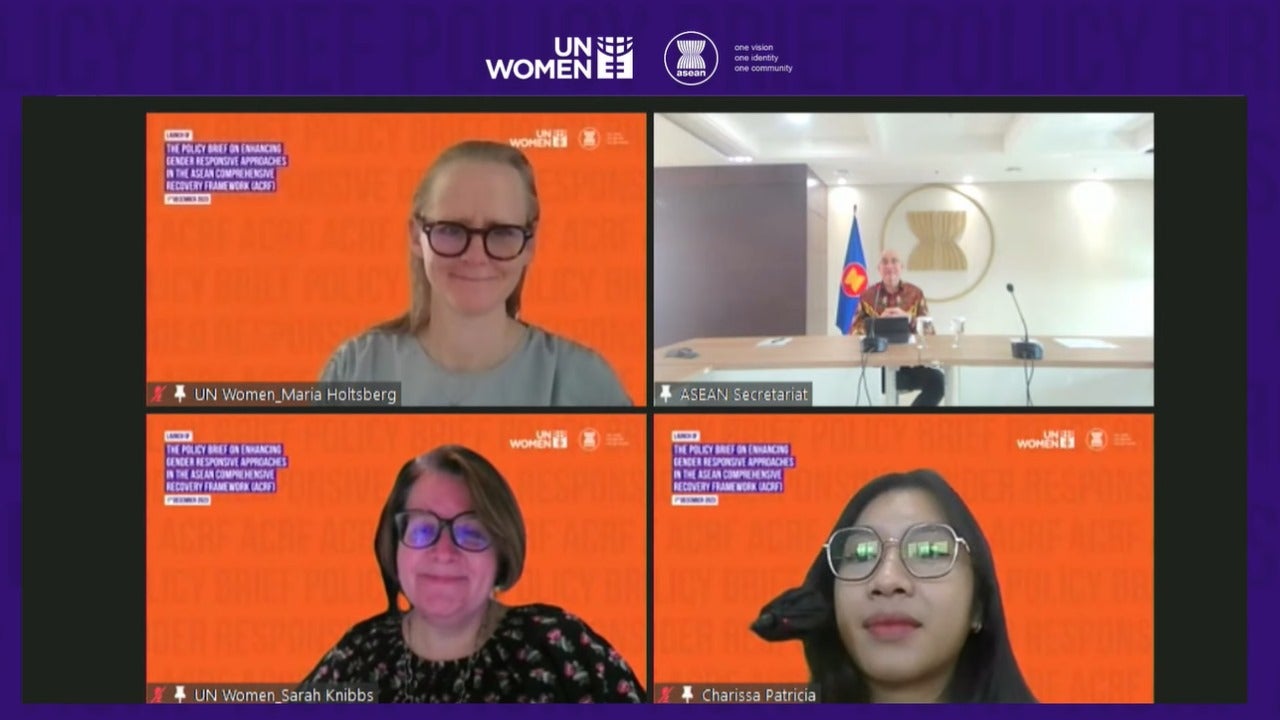ASEAN, UN Women developed policy brief to build long-term recovery for women from the COVID-19 pandemic
Date:
[Press release]

Jakarta, Indonesia — At the onset of the COVID-19 pandemic, women and girls bear a disproportionate burden, grappling with heightened vulnerabilities and enduring severe socioeconomic impacts compared to their male counterparts.[1]
Recognising the on-going transition from the COVID-19 pandemic to promote resilience for ASEAN peoples, ASEAN Secretariat and UN Women jointly developed a policy brief entitled Enhancing Gender Responsive Approaches in ASEAN Comprehensive Recovery Framework (ACRF). The Policy Brief aims to showcase best practices and lessons learned from the implementation of gender-related initiatives under the ACRF, serving as a consolidated regional exit strategy from the COVID-19 pandemic.
“Recognising the severity of the [COVID-19] situation, the ASEAN Comprehensive Recovery Framework (ACRF) places due importance on addressing the impact on vulnerable populations and strives to mitigate their economic and social repercussions. This policy brief builds upon the valuable lessons learned from the implementation of the ACRF and provides comprehensive recommendations and pathways to integrate a gender mainstreamed approach in ASEAN’s initiatives across various dimensions including health, human security, economic integration, digitalisation, and sustainability,” as emphasised by Satvinder Singh, Deputy Secretary-General of ASEAN.
“What is good for gender equality is good for all. By placing gender and human rights considerations at the heart of COVID-19 response and recovery planning, ASEAN governments can ensure that their respective nations are well-placed to recover any gains lost during the pandemic, as well as to reap the long-term rewards that come from choosing inclusive, empowering and sustainable models of development,” says Sarah Knibbs, Deputy Regional Director of the UN Women Regional Office for Asia and the Pacific, in a preface.
Moving forward, as the region is embarking its endeavour on the development of ASEAN Community Vision 2045’s strategic plan(s), gender-responsive recommendations outlined on the policy brief may also be adapted and localised for ASEAN Members States. Specifically, this policy brief can serve as a pivotal reference for policymakers aspiring to integrate inclusivity and participatory processes into the core of future ASEAN initiatives and agendas.
Footnote
[1]
According to a UN Women analysis of violence against women surveys during the pandemic in 13 countries, 68 per cent of all women respondents said they think the incidence of physical or verbal abuse by a spouse/partner increased during the pandemic. And a 2020 report on The Gendered Effects of COVID-19 on Achieving the SDGs in Asia and the Pacific found that more than 40 per cent of civil society organizations saw increases in cases of violence. The 2021 ASEAN Gender Outlook by ASEAN and UN Women revealed that more women than men experienced illness (not necessarily COVID-19 related) since the spread of the virus, but only 70 per cent of women were able to see a doctor; 9 per cent of women and girls reported experiencing physical and/or sexual violence by an intimate partner in the past 12 months; and 30 per cent of women noted increases in the intensity of domestic work since the beginning of the pandemic, versus just 16 per cent of men.
And according to UN Women COVID-19 rapid gender assessments, in the Asia-Pacific region, women were more likely than men to: lose their jobs (28 vs. 27 per cent); see their working hours decreased (52 vs. 49 per cent); spend increased time on at least one childcare activity (64 vs. 58 per cent; have difficulty accessing water (22 vs. 21 per cent); and experience increased mental/emotional stress (75 vs. 73 per cent); while women were far less likely than men to: receive unemployment insurance (6 vs. 14 per cent); receive cash relief from government (9 vs. 19 per cent); or receive support from NGO.
MEDIA CONTACTS:
Diego De La Rosa
Regional Communications Specialist
UN Women Regional Office for Asia and the Pacific
Email: [ Click to reveal ]
Phone: +66995037177
Mustika L. Hapsoro
Media Officer
ASEAN Secretariat
Email: mustika.hapsoro@asean.org